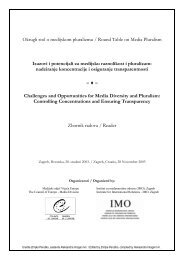almanac on security sector oversight in the Western Balkans
almanac on security sector oversight in the Western Balkans
almanac on security sector oversight in the Western Balkans
Create successful ePaper yourself
Turn your PDF publications into a flip-book with our unique Google optimized e-Paper software.
The formative phase was crucial for later, albeit uneven, developments of SSR <strong>in</strong> <strong>the</strong><br />
regi<strong>on</strong>. A radical part<strong>in</strong>g with <strong>the</strong> old regime was delayed and made more complicated<br />
due to <strong>the</strong> wars and/or war envir<strong>on</strong>ment. This is also <strong>the</strong> reas<strong>on</strong> why <strong>the</strong> countries<br />
of <strong>the</strong> <strong>Western</strong> <strong>Balkans</strong> spent so much time <strong>in</strong> <strong>the</strong> grips of authoritarian regimes<br />
which local authorities tried to make legitimate. 192 It is <strong>the</strong>refore not supris<strong>in</strong>g that<br />
<strong>the</strong> processes of <strong>in</strong>itial and/or fake democratisati<strong>on</strong> and SSR often developed <strong>on</strong> two<br />
separate tracks.<br />
The above-menti<strong>on</strong>ed processes of <strong>the</strong> 1990s enabled <strong>the</strong> prol<strong>on</strong>ged survival and mutati<strong>on</strong><br />
of an ethno-centric authoritarian regime <strong>in</strong> Serbia (Popović et al., 2011, pp.9-11)<br />
and M<strong>on</strong>tenegro (FRY, SU SaM) (Radević and Raičević, 2011, pp.7-10), and its establishment<br />
<strong>in</strong> Croatia. 193 In both cases, plebiscite caesarianism was active under a disguise of<br />
democracy, enabl<strong>in</strong>g <strong>the</strong> central state authorities to ga<strong>in</strong> and renew <strong>the</strong>ir legitimacy<br />
at regular, but not necessarily fair, electi<strong>on</strong>s. For <strong>the</strong>se same reas<strong>on</strong>s, <strong>the</strong> authoritarian<br />
model of rule is still employed by local ethnic-religious elites <strong>in</strong> <strong>the</strong> entities of Bosnia<br />
and Herzegov<strong>in</strong>a, despite its externally <strong>in</strong>stalled democratic facade (Hadžović et al.,<br />
2011, pp.9-16). A similar model is applied <strong>in</strong> Kosovo, where power is still c<strong>on</strong>trolled by<br />
elites, a by-product of war (Qehaja and Vrajolli, 2011, pp.12-14). On <strong>the</strong> o<strong>the</strong>r hand,<br />
Albania, under <strong>the</strong> rule of <strong>the</strong> Democratic Party and after <strong>the</strong> ex-communists ga<strong>the</strong>red<br />
<strong>in</strong> <strong>the</strong> Socialist party lost <strong>the</strong> electi<strong>on</strong>s <strong>in</strong> 1992, witnessed <strong>the</strong> formati<strong>on</strong> of a new type<br />
of authoritarianism. It was accompanied by <strong>the</strong> streng<strong>the</strong>n<strong>in</strong>g of <strong>the</strong> political elites’<br />
pers<strong>on</strong>al power overstate <strong>security</strong> forces (Dyrmishi et al., 2011, p.8). At <strong>the</strong> same time,<br />
<strong>in</strong> Maced<strong>on</strong>ia, members of <strong>the</strong> local ethnic Albanian community denied <strong>the</strong> legitimacy<br />
of <strong>the</strong> new regime and <strong>the</strong> state apparatuses of force until <strong>the</strong> Ohrid Agreement was<br />
signed <strong>in</strong> 2001. Str<strong>on</strong>g ethnic divisi<strong>on</strong>s directly dim<strong>in</strong>ished <strong>the</strong> modest democratic capacities<br />
of <strong>the</strong> new <strong>in</strong>stituti<strong>on</strong>s <strong>in</strong> Maced<strong>on</strong>ia (K<strong>on</strong>eska and Kotevska, 2011, pp.7-13).<br />
3 . The emergence and shap<strong>in</strong>g of <strong>security</strong> <strong>in</strong>stituti<strong>on</strong>s<br />
The emergence and shap<strong>in</strong>g of <strong>security</strong> <strong>in</strong>stituti<strong>on</strong>s <strong>in</strong> <strong>the</strong> <strong>Western</strong> Balkan countries<br />
were mostly determ<strong>in</strong>ed by <strong>the</strong> collapse of socialism and <strong>the</strong> wars waged <strong>in</strong> <strong>the</strong> regi<strong>on</strong>.<br />
In this secti<strong>on</strong> I will p<strong>in</strong>po<strong>in</strong>t <strong>on</strong>ly <strong>the</strong> factors that were crucial <strong>in</strong> def<strong>in</strong><strong>in</strong>g <strong>the</strong> form,<br />
social and professi<strong>on</strong>al profile, and power and positi<strong>on</strong> <strong>in</strong> society of <strong>the</strong>se <strong>in</strong>stituti<strong>on</strong>s.<br />
The <strong>Western</strong> Balkan countries can be divided <strong>in</strong>to two dist<strong>in</strong>ct groups accord<strong>in</strong>g to<br />
<strong>the</strong>ir start<strong>in</strong>g positi<strong>on</strong>s. The first group <strong>in</strong>cludes Croatia, Maced<strong>on</strong>ia and Kosovo, as<br />
<strong>the</strong>y ga<strong>in</strong>ed <strong>the</strong>ir <strong>in</strong>dependence dur<strong>in</strong>g <strong>the</strong> violent dissoluti<strong>on</strong> of Yugoslavia. Their<br />
state <strong>security</strong> forces were created out of (pre)war necessity, <strong>the</strong>ir purpose be<strong>in</strong>g to<br />
create new states by armed force and/or protect <strong>the</strong>m. Bosnia and Herzegov<strong>in</strong>a cer-<br />
192 In <strong>the</strong> countries of Yugoslav orig<strong>in</strong>, new authorities covered <strong>the</strong>mselves with <strong>the</strong> veil of democracy<br />
primarily to achieve external legitimacy, while <strong>in</strong>ternally <strong>the</strong>y legitimised <strong>the</strong>mselves primarily by means<br />
of ethnic-religious and state-build<strong>in</strong>g arguments and reas<strong>on</strong>s.<br />
193 See also Knezović and Staničić, 2011, pp.14-16, which describes it as a semi-presidential system with<br />
democratic deficits.<br />
218



